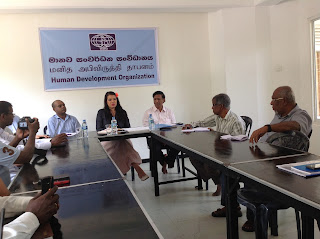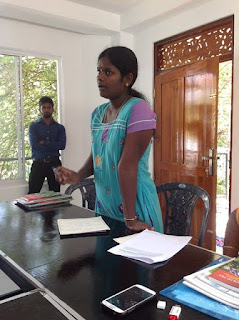The United Nations Special Rapporteur on minority issues, Rita Izsák-Ndiaye, arrived in Sri Lanka on 10th October, to assess the current situation of national or ethnic, religious and linguistic minorities in the country. She also visited Human Development Organization and the Plantations in Kandy areas to assess the real living and working situation of the plantation people in Sri Lanka.
Wednesday, October 19, 2016
Monday, October 17, 2016
Human Development Organiztion: AMinority Rights Commission to be established…..H...
Human Development Organiztion: AMinority Rights Commission to be established…..
H...: A Minority Rights Commission to be established ….. Human Development Organization (HDO) demands…. The United Nations Special Ra...
H...: A Minority Rights Commission to be established ….. Human Development Organization (HDO) demands…. The United Nations Special Ra...
A
Minority Rights Commission to be established…..
Human Development Organization
(HDO) demands….
 The United Nations Special
Rapporteur on minority issues, Rita Izsák-Ndiaye, arrived in Sri Lanka on 10th
October, to assess the current situation of national or ethnic, religious and
linguistic minorities in the country. She also visited Human Development
Organization and the Plantations in Kandy areas to assess the real living and
working situation of the plantation people in Sri Lanka. Commencing her visit, Ms. Izsák-Ndiaye had a
constructive dialogue with Upcountry CSOs, academics, health professionals,
lawyers and workers. The dialogue was organized and chaired by Mr. P.P.
Sivapragasam, President of Human Development Organization in Kandy.
The United Nations Special
Rapporteur on minority issues, Rita Izsák-Ndiaye, arrived in Sri Lanka on 10th
October, to assess the current situation of national or ethnic, religious and
linguistic minorities in the country. She also visited Human Development
Organization and the Plantations in Kandy areas to assess the real living and
working situation of the plantation people in Sri Lanka. Commencing her visit, Ms. Izsák-Ndiaye had a
constructive dialogue with Upcountry CSOs, academics, health professionals,
lawyers and workers. The dialogue was organized and chaired by Mr. P.P.
Sivapragasam, President of Human Development Organization in Kandy.
During
her mission to Kandy, she visited Estates in Deltota areas of Kandy district
and met with minority communities,
estate workers and women to hear directly from them about their issues and
concerns.
Following
issues were discussed.
Poverty: They
are the most poverty stricken people in the country. Ironically, a Household
Income & Expenditure Survey Statistics in 2012/13 (HHI&ES) stated that
the poverty level among these people has shown 10.9%, (HCI) while compared to
year 2006/07 which was 32 percent, the credulity of which was open to question
and criticism.
Land & Housing: Land
and Housing rights of the hill country plantation people is another
controversial issue. 67.8% (HHI&E
Survey 2012/2013) of them still live in line rooms which were built during the
colonial era. At the same time even
these lines and the land space on which the lines stand are not given to their
ownership. The government of good governance implementing housing projects for
the plantation workers is laudable. However the process needs to be accelerated
and expanded. The other problem affecting these people is their language right.
The failure to appoint adequate Tamil officers in the government institutions
in the areas of their predominance has made their condition pathetic.
Access to public services:
there are over 200,000 people to be covered by the each Ambagamuwa and Nuwara
Eliya Divisional Secretariats in the Nuwara Eliya District. This has become
stumbling block to the Tamil people of these areas to accessing state services.
Article 33 of the Pradeshiya Sabha Act of Sri Lanka prevents these people from
being benefited from the local authority services. This emphasizes the need for
an amendment to the Act.
Education & Health: The
right of the plantation people to education and health services are relatively
backward. Although the present government has made an allocation in the budget
at national level, as far as the hill country areas are concerned, there are a
few 1 AB schools to teach science and equipped with residential facilities. For
example 60% of the population in the Nuwara Eliya District are Tamil. But while
there are only 7 1AB School for them, there are 19 Sinhala medium schools
(2013). This disparity is notable. The
plantation medical health service should be upgraded to conform to National and
International standards. Notably the children’s and women’s reproductive health
aspect is backward. At present a vast
majority of the plantation medical institutions are manned by Estate Medical
Assistants, who sometimes perform as doctors. This has become a challenge to
the national stream.
Right to Livelihood: The
right of the hill country plantation people to livelihood is a fundamental
right. Their daily wage is determined on the basis of collective agreement.
That too has not been renewed for the last 2 years resulting in the freeze of
their wage. Negotiation between the trade unions and the employer’s federation
has failed. It’s very much in question whether the parties follow the corporate
Social Responsibility or the Code of UN Global Compact. Plantation workers are
the lowest paid as far as this country is concerned-receiving the lowest daily
wage compared to their counterparts in the other sectors and even the
non-formal sector workers. This has pushed them into eternal poverty.
There
are various obstacles and discrimination on these people’s way to access to
development services. It’s tied to
social, economic and political rights. But as many plantations are company
managed or state agency (JEDB/SLPC)
managed, there are short comings and setbacks. to the national development
project’s and development benefits-reaching or the plantation people reaching
such benefits.
Constitutional Reform : In-order to ensure credibility in the political culture of Sri Lanka and to maintain a check and balance in the democratic good governance, we suggest that the senate system be re-introduced with an equal minority and professional representation. Any bill introduced to parliament be transmitted to the senate for its approval.
 Political
Representation: Pressure
and demand for the change of the present proportional representation system has
gathered momentum, since it is corruption ridden and a source of violence. At
the same time, the proportional representation system appears to be favorable
to demographic minorities and particularly the up country Tamils and Muslims.
Therefore civil organization opin that the parliamentary and political system
under the new constitution be an electoral representation system and the
proportional representation system combine. We believe this will enable not
only the up country Tamil people who live scattered but even the Sinhala and
Muslim people who live scattered in the Northern Province and rest of the
country to have their political rights ensured
Political
Representation: Pressure
and demand for the change of the present proportional representation system has
gathered momentum, since it is corruption ridden and a source of violence. At
the same time, the proportional representation system appears to be favorable
to demographic minorities and particularly the up country Tamils and Muslims.
Therefore civil organization opin that the parliamentary and political system
under the new constitution be an electoral representation system and the
proportional representation system combine. We believe this will enable not
only the up country Tamil people who live scattered but even the Sinhala and
Muslim people who live scattered in the Northern Province and rest of the
country to have their political rights ensured
Commission on Minority Rights:
A Commission to be established on minority rights. (Like in India..) Structural
change of the plantation sector is the much talked about subject of late.
Should the workers be identified as free labour, it could be achieved only if
their fundamental rights are guaranteed constitutionally.
Subscribe to:
Comments (Atom)






